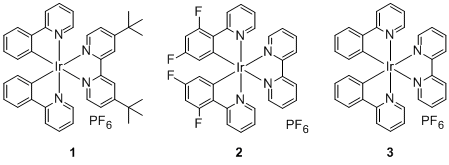Published TCIMAIL newest issue No.197
Maximum quantity allowed is 999
Merci de sélectionner la quantité
Visible Light Photoredox Catalysts
No.171(October 2016)

A photocatalyst working for both one-electron oxidation and reduction under visible light irradiation, the so-called “visible light photoredox catalyst”, receives much attention, because there is the possibility for use as a solar energy source.1) A reaction mediated by a photoredox catalyst particularly works simply, whereas a thermal reaction under coexistence of oxidizing and reducing reagents is normally hard to make work. The reaction cycle using a photoredox catalyst involves both oxidative and reductive pathways, thus it shows a ‘redox-neutral’ mechanism overall.

Some ruthenium(II) polypyridyl complexes and iridium(III) phenylpyridyl complexes (1, 2 and 3) work as photoredox catalysts under irradiation of visible light.2,3) These transition metal complexes are useful photocatalysts, because they can form a long-lived triplet-excited state under photoirradiation. A chemical modification of the coordinating ligands controls the redox potentials of the transition metal complexes.4)
References
- 1)Review: Synthetic applications of photoredox catalysis with visible light
- 2)Photoredox catalysis with visible light
- 3)Photoredox-catalyzed stereoselective conversion of alkynes into tetrasubstituted trifluoromethylated alkenes
- 4)Review: Shining light on photoredox catalysis: Theory and synthetic applications
Related Compounds
The prices are subject to change without notice. Please confirm the newest price by our online catalog before placing an order.
In addition, sales products changes with areas. Please understand that a product is not available when the product details page is not displayed.
In addition, sales products changes with areas. Please understand that a product is not available when the product details page is not displayed.

